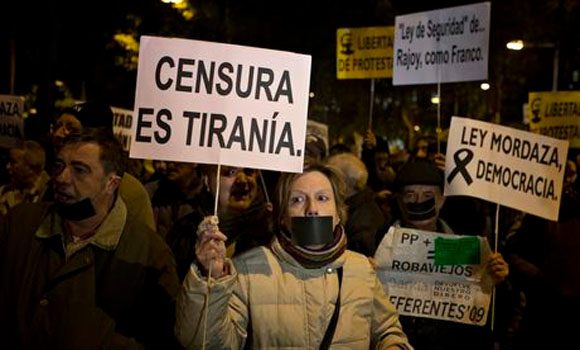Ashifa Kassam
Report paints picture of heavy-handed government response to country’s growing social movements
The Spanish government is using fines, harassment and excessive police force to limit the right to protest, Amnesty International warned in a new report released on Thursday.
Against a backdrop of chronic unemployment and shrinking public funds for education, health and social services, a growing number of Spaniards have taken to the streets in recent years. But “instead of listening to their demands, instead of starting a dialogue, authorities are doing everything they can to impede people from protesting”, said the report’s author, Virginia Álvarez.
Amnesty International tracked several protests in Madrid and Barcelona during the past year, gathering first-person accounts, interviewing journalists and lawyers and analysing videos and photographs.
The resulting report paints a stark picture of a heavy-handed government response to the country’s growing social movements.
“With threats of fines or threats of being beaten, the government is trying to stigmatise and criminalise people who are just practising their rights.”
In March, a violent clash between riot police and demonstrators in Madrid earned headlines around the world and left more than 100 people injured, including 67 police officers.
Pointing to a rise in street violence carried out by radical groups, Spain‘s director general of national police told parliament on Wednesday that the head of the anti-riot squad had been dismissed and police services were being restructured to deal better with what he called “an escalation of violence never seen before”.
Amnesty International found that although the vast majority of protesters were peaceful, police treated them in the same manner as those who incited violence. In many cases, said the report, police had used excessive force to confront protesters.
“The impunity of police in Spain is something we’ve been covering for many years,” said Álvarez. “But now we’re seeing it in the distinct context of social protest.”
The report documents several cases of excessive police force, such as that of Ester Quintana, an unemployed 43-year-old from Barcelona who lost her left eye in 2012 after being struck by a rubber bullet as she was leaving a protest.
Despite the many witnesses and video recordings that showed riot police firing rubber bullets, the interior minister of the Catalan regional government initially denied they had done so during the protest.
Instead, the minister insinuated Quintana’s injury may have been caused by an object thrown by other demonstrators. “These were normal people, who were unjustly fined, unjustly beaten and afterwards were victimised all over again as they tried to find justice and found only inadequate investigations into their cases,” said Álvarez.
Many of those interviewed by Amnesty International had been detained by police during protests. They spoke of treatment that varied by gender, with men often subject to a higher degree of violence and women pelted with sexist insults. One 21-year-old shared her frustration at being called Snow White and taunted over whether she wanted sex or water while being taken into custody.
These actions are having a dissuasive effect on protesters, said the organisation. As one 49-year-old activist explained: “They say that the movements are losing force, but the reality is that people are scared.”
Citing public disobedience, fines ranging from €300 to €1,500 (£250 to £1,245) have become commonplace for protesters, said Jezerca Tigani, deputy director for Europe at Amnesty International.
“Many of the people who are attending these protests face financial constraints. They are totally and completely unable to pay the fine,” she added.
The members of the Mortgage Victims’ Platform (PAH), in their fight to halt the number of home repossessions in Spain, have racked up more than €40,000 in fines.
Spanish authorities have been allowed to develop these practices, said Tigani, because the country’s legislation is out of step with European and international human rights standards. “On top of that, the Spanish authorities have been really stretching beyond what the existing legislation allows for,” she added.
Rather than aim to bring the situation in line with international standards, the Spanish government is looking to further entrench this manner of dealing with protesters, she said, citing the strict anti-protest laws currently being drafted by the government. “Now they are talking about fines of up to €600,000 for protesting. That tells you how extortionist this is.”
In the coming days, Amnesty International will present its report to various government bodies in Spain, including the ministries of justice and the interior.
“The authorities do know what is going on. Other international bodies are raising very similar concerns,” said Tigani. “Whatever the authorities are doing has no place in a society that calls itself democratic.”


